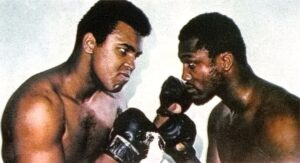Violence, Our Brains, and Our Darkest Selves
By Brennan Beausir
Russ Roberts hosts this episode of EconTalk with guest Eric Jacobus. Jacobus is a stuntman, actor, and martial artist who also produces action codes for movies and video games. In this wide-ranging conversation, Roberts and Jacobus talk about mirror neurons, violence, and how animals and humans are different with regard to violence.
Let’s hear what you think. Leave your thoughts on the prompts below in the comments, or use them to start a conversation of your own offline. We’re here for it!
1- Roberts and Jacobus discuss the stark contrast in violent escalation between humans and animals. Animals avoid escalation and murder, as Roberts defines violence between animals as theatrical, where animals try to establish dominance as opposed to murdering each other. Roberts and Jacobus discuss the idea of processing intentions where humans have used ‘tools’ to assist them in violent acts.
Along with the reality of accessible weaponry, why else are humans quicker to escalate violence than animals are? Why might someone who consumes more violent media or just media content in general be unbothered by or extremely concerned of the threat of violence?
2- Humans and animals both have mirror neurons, which dictate our conclusions about others’ intentions before we can even think about them. Citing Jacobus, we “virtualize everything.”
What are some everyday motor actions that you find challenging to anthropomorphize and virtualize to make accurate, instantaneous judgements of others’ intentions? Apart from Jacobus’ and Roberts’ discussion of Muhammad Ali, who can you think of that is a master of ‘virtualizing’ others’ motor functions to their own advantage?

3- Jacobus and Roberts allude to the connection between virtualizing and advertising, where media can play to the sensors of mirror neurons in humans to entice or manipulate their attention.
How does imagery in political advertisements utilize mirror neuron stimulants? Can you think of any examples where the media uses mirror neuron stimulants unethically?
4- Roberts and Jacobus highlight Adam Smith’s concept of moral sentiments as being logically adjacent to the idea of mirror neurons.
How does the concept of virtualizing relate to Adam Smith’s conception of moral sentiments and the natural feeling of empathy people have for one another? What are your thoughts about the accuracy of mirror neurons over time; how do they develop in us?
5- Roberts discusses his repulsion towards more realistic violence in media, which can evoke depression for viewers; instead, he prefers stylized violence like in Jackie Chan’s films.
Why is realistic, brutal violence so popular in shows and movies today? What might it have to do with Roberts’ claim about the darkest parts of ourselves as humans? Can humans confront and temper the parts of ourselves which we hide vicariously through fictional figures or public figures? How does violence in media contribute to humans’ long-lasting propensity to escalate violence in open conflict, with no external rules?
[Editor’s note: This Extra was originally published on June 10, 2023.]
Brennan Beausir is a student at Wabash College studying Philosophy, Politics, and Economics and is a 2023 Summer Scholar at Liberty Fund.

